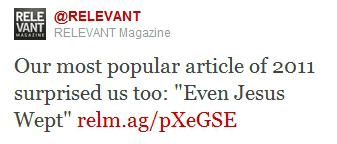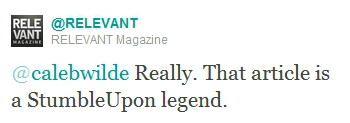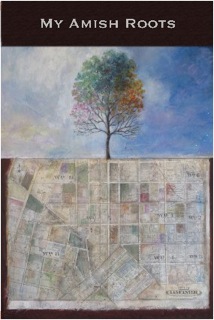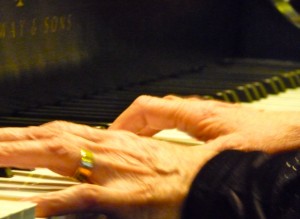Miscellaneous
On Being the Author of Relevant Magazine’s 2011 “Most Popular Article”
I have my twitter account synced to my cell phone, which Nicki hates because every time I receive a new twitter follower, my cell phone beeps. And although I don’t have numerous twitter followers, every once in a while …
In the middle of a funeral: “Beep!”
In the middle of dinner: “Beep!”
In the middle of the night: “Beep!”
I’d turn my cell phone off, but I’m on call 24/7, every day of the week so I have to keep it on.
This past Friday night at around 11 PM my phone starts going off about every 30 seconds, notifying me of a new twitter follower. After about a dozen new twitter followers I begin to get slightly suspicious and start doing some Twitter research to see why so many people would want to follow a funeral director.
And then I see this:
“I wrote that”, I thought to myself.
I was pretty sure it was a mistake, so I replied:
To be fair – for those of you who aren’t familiar with StumbleUpon – the effect of SU can produce a false positive in that the hits SU produces are more quantity and less quality. Yes, I beat out Rock Star Rob Bell’s exclusive interview with Relevant … but let’s be serious, I’m just a funeral director.
But still … more hits than an exclusive interview with Rob Bell … at the height of “Love Wins”?!?!
I went to bed with my head expanding with hot air as I pondered this question:, “Hmmm … what perks does this accomplishment entitle me to at the Funeral Home?”
Maybe a couple “Get out of Doing Morgue Work” passes.

Sporting a normal plastic morgue apron, with fashionable scarf and the traditional "funeral director smile". Also, I'm sick in this photo.
Could I get a company car that’s a Lamborghini converted into a hearse?
Possibly I’m entitled to a golden Trocar with my name engraved in it.
Or, maybe they should make a prize that’s given to the most famous funeral director in Parkesburg, and give out the inaugural trophy to yours truly.
Instead of a trophy, maybe the prize could be a diamond encrusted, genuine leather morgue apron that says, “Most Famous Funeral Director in Parkesburg 2011.”
Actually, though, I’m more like the fifth famous funeral director in Parkesburg. As we’re the only funeral home in Parkesburg and the rest of my family is by far much more well known than me. People still say, “Oh, you’re Bill’s son” or, “You must be Bud’s grandson.” Few here in Parkesburg know my first name.
I couldn’t in good conscious take that diamond crusted apron of awesomeness.
Then I speculated, “Could Rob Bell call me up and want to prearrange his funeral with me?” Then I could hold the title as “The Only Man to Bury Rob Bell.”
Maybe the Relevant post entitles me to a raise at the funeral home … and at this point in my late night day dreaming I started to fall asleep. Only to be awoken early the next morning (New Year’s Eve) by the sound of my buzzing phone.
“Hellooo” I said in a voice that was attempting to mask the fact that I just woke up. It was my dad on the other line and I could tell his tone that he was a step away from being peeved.
“Didn’t you get my text?” he asked.
“No.” I responded, “My phone was on vibrate last night.” I said this while thinking to myself “it’s on vibrate because I’m so freakin famous.”
“Well, I texted you some time ago. We have a call at the hospital. Get your clothes on and come to work.”
Reality sets in. The expanded cabaza begins to deflate. No diamond encrusted apron awaits me. No “Get out of Doing Morgue Work” passes. And since I’m late, there will definitely be no raise.
****
This “most popular article” news comes at about the one year anniversary of me deciding it’s time to get serious about writing/blogging.
That commitment to blogging coincided with me finding Bryan Allain’s blog and buying his book. Now, a year later, I’m beginning to touch a small segment of the world where Jesus likes to dwell … with the weak and the broken. I want to see people worship God through their sorrow. That’s why I write.
Maybe next year I’ll get my diamond studded morgue apron.
A Tiny Casket, A Hole in the Ground, and Heaven
Bill Stauffer is a pastor in rural NJ, where he mostly chases around his eight-year-old twins. He likes to chase his wife, too.
*****
It was a terrible tragedy – unspeakable – and it was making the rounds on Facebook: a local two-year-old boy killed in a house fire. As the details came out, there were a number of families in town sharing in the grief of this boy’s death. A little boy, lost to his father, his stepfather, his mother (sedated and in the hospital still days later), and all types of extended and blended families and relationships. A number of them in the church where I am an associate pastor.
The weird thing about death for me is that it was so present in my early life, that even the worst of tragedies now require me to step way outside of myself to feel them for others. It’s like a scar with no nerve endings. By the time I was ten, I had lost all of my grandparents, two uncles, a number of family friends, and my father. Death shaped me. I knew it was shaping these people, too. It was carving out new chasms of pain. They were becoming more human.
Because one of the boy’s cousins was in my youth group, I was asked to lead the graveside service, as the Catholic priest who was presiding at the funeral mass could not be there because of a prior commitment. Whenever you get asked to preside over death, something happens. You sense a seriousness come over you. It’s involuntary. You will have the final say in people’s interaction with their loved one. Perhaps more than that, you will have the outrageous privilege and responsibility of helping them bridge this world and the next. In this case, it was connecting the infinite with a little boy in a tiny casket suspended over a gaping hole in the ground.
I was raised Catholic. When I step inside a Catholic Church building, unlike most other ex-Catholics I know who went over to the protestant dark side, I have a sense of coming home. My uncle, a priest himself, was one of the finest men I ever knew. He was the constant in my family when death reigned during my early years. The smells, the sounds, the liturgy, the bad music – it’s like putting on your favorite pair of comfortable, but woefully out of fashion shoes. You would never wear them in public, but in private, you miss them and occasionally slip them on to knock around the house in.
What struck me this day as I entered the narthex of the church was the open grieving already taking place. That was familiar, too. I can clearly hear my Aunt Peggy crying and screaming over the open casket of my uncle, her brother, Billy, dead in his early 40’s. I was five. It was surreal, but very emotionally honest. We button down Protestants need some of that in our emotional mix – honesty. This little boy’s family was grieving like that, and strangely, it gave me a sense of hope for them. It certainly gave me love for them.
During the funeral mass, from my vantage point in the back row, I viewed a room full of people full of sorrow, hopelessness, pain, and anger, with no outlet but flowing tears. My friend Sue was next to me in the pew. When she saw the tiny casket, she wept. “That’s not right!” The father and the stepfather carried their little boy up to the front of the church. Impossible to fathom.
At the graveside we stood at that intersection, the visible and invisible, and tried to make sense of what we could. I told them that little Zack was safe in Jesus’ arms. I told them that Jesus hated death; that it frustrated and angered him. I told them Jesus knows. He knows. He knows.
About their anger. I told them to take it to God in full force, that he was big enough to handle it from them, that is was real and needed to be voiced. God is such a pragmatist. He uses what’s at hand to grab hold of us. He uses pain and suffering to draw us to him. He uses joy and pleasure. Anything, really – whatever is in the emotional cupboard at the time. And that’s when it struck me.
Death is a spiritual ear opener. It unplugs the hard, waxy buildup of mundane, self-consumed life and lets us hear eternity calling. And in that moment, standing by that tiny casket over a gaping hole in the ground, it happened. There, in the cold, listening to the weeping and sniffling and occasional outbursts of tears, heaven spoke. It was Jesus saying, “Come to me, and bring your suffering. Bring your sorrow – I know. Bring your anger – I know. Bring your hopelessness – I know that, too. I’ve got what you need. Me”
Jesus was there, in Zach’s most frightening hour. He was there to comfort and take Zach home.
And I pray that Jesus — as Zach’s family grieves in the months and years to comes — takes this broken and beautiful family in His arms and ravages them the only way a good God can. They, and we, can live in the love of a God who wants nothing more than for us to simply “Come.”
A Lesson in Significance from My Mom’s Funeral
Andi Cumbo is a writer, editor and writing teacher who is currently working on a book about the people who were enslaved on the plantation where she now lives. She blogs regularly at www.andilit.com and if you’d like more information about her book project, you can visit her Kickstarter page.
*****
It’s easy to think that to make a difference we have to do great things – cure a disease, write a bestseller, invent the newest social network, end hunger. Somehow, we have come to think that greatness only comes with magnitude, not with simplicity or individual attention. We have some to see the day to day as mundane, unimportant, invaluable. My mom knew better.
The church that day seemed to shimmer with light. Despite the tears and the grief, the place felt serene, peaceful, uplifted, like a strong arm was pulling us all close to share our warmth with one another.
Every single pew was full of people who loved my mom. I don’t know why this surprised me; she was loved by everyone who knew her. I suppose somehow I had absorbed the view she had of herself – that she was “just a piano teacher” and “just a church choir director.” Inadvertently, I had come to understand her as she saw herself, but no one ever thought of her as “just” anything.
Each week for over 20 years, Mom taught dozens of kids how to play the piano, but while there was music involved in her lessons, more than anything, these were times where her kids (as she called them)got one on one attention from someone who, despite lack of familiar relation, loved them unconditionally. She would tell me about them when I came home to visit – the funny stories they shared about school and the challenges they faced with the demands of childhood. That time on the piano bench with Mrs. Cumbo was precious – for them and especially for her.
One evening a week, Mom led the church choir. Her practices – I was recruited for many of them by means of daughterly obligation and mirth – were full of laughter and Mom’s dry, dry wit. Her sense of sarcasm blended perfectly with her tact to make her not only a very accomplished director but a motivator as well. While we may never have rivaled the Cambridge Singers, Mom always helped us make a “joyful noise.”
So that day, one year ago, where we filled the church to celebrate Mom’s life, when the place was haloed in love and a peace that passes all understanding, we did our best to make a joyful – if tearful – noise, in honor of the woman who was never “just” anything. The woman who knew meaning and change came through a piano bench and a little sarcasm on a Sunday night. Thank you, Mom.
Why I Have Begun to Subscribe to the Reformed God
My friend, and fellow seminarian at Biblical, Mike Landsman, responds to my post “Why I Haven’t (Yet) Subscribed to the Reformed God”.
*****
I am probably not the right person to write about Reformed theology because technically I’m not Reformed. I never grew up Reformed and never heard of Reformed theology until about two years ago.
I thought I was a deep thinking Christian because I didn’t hold much of the Charismatic doctrine I was raised in and because I read Phillip Yancey books.
Then one day I stumbled ass-backwards into material by John Piper, Tim Keller, and R.C. Sproul. It felt like I was picked up and thrown into the deep end of the pool. I certainly don’t know everything there is to know about it, but I have been increasingly turning to it for comfort and for a foundation on which to build.
On the surface Reformed theology can sometimes appear to be concerned with doctrinal minutiae at the expense of everything else. I believe this is unwarranted. Luther, Calvin, and other leaders would send people out to plant churches all over Europe, often in places of intense persecution.
Also it must be understood that historically the Roman Church’s magisterium had a thousand years to add unbiblical practice on top of unbiblical practice. Reformed theology is so detailed because it had to be.
Reformed theology is detailed not because no one had anything better to do then navel gaze and think about aspects of God’s sovereignty instead of helping poor people. They had to study, pray, teach, and catechize. They searched the Scriptures and went back to the church fathers and had to formulate doctrines, such as God’s sovereignty, in order to counter the theology of Rome.
Reformed theology makes us, or should make us, uncomfortable. It makes us keenly aware of our spiritual state outside of the atoning work of Jesus on the cross. We are all sinners, all deserving of death, and the only thing that differentiates us from others is Jesus.
That drives us, or should drive us, to share the gospel and to talk about the love and grace of God. Anyone who sits back in comfort feeling like they know they are part of the chosen is probably not regenerate in the first place since pride is a work of the flesh.
I think the big issue here is a misunderstanding of the love of God.
We have this pop-culturally shaped understanding of a God who is love, who excuses all sin, and lets all bad behavior or sin go because of grace. Our understanding of God’s love has to start from Scripture not from how we think God’s love can or should operate.
If you want to see God’s love look to the cross.
If you want to see God’s wrath look to the cross.
If you want to see God’s endgame for all things look to the cross and the resurrection.
The God who holds all things, rules all things, and has a purpose in all things is infinitely preferable to a god who responds capriciously, or a god who acts in the way we think is fair.
We like to throw around the idea that God causes all things to work towards good but we always stop short of reading the rest of the verse that explains that all things are promised to work for the good only of those he has called.
The reason why I love the Reformed ideal of God is because I believe the Reformed ideal of God is the God of the Bible. The god I was taught to believe in was a god who was subject to the whims of man and who waited for man to make decisions before reacting to man’s choices.
Like Caleb mentioned in an earlier blogpost, God is wild and untamed, but good. And only in Reformed theology do we see a picture of an untamable sovereign God who is good and who does good even in the face of the most dire of circumstances.
Praise his name he gave us the Scriptures so we can see his character for what it truly is and base our knowledge of him on his self-revelation and not on personal experiences or philosophically based explanations of his character.




 Do we have any tangible ways of preparing for death? Or do we spend most of our time denying the fact that it will someday happen to us?
Do we have any tangible ways of preparing for death? Or do we spend most of our time denying the fact that it will someday happen to us?
